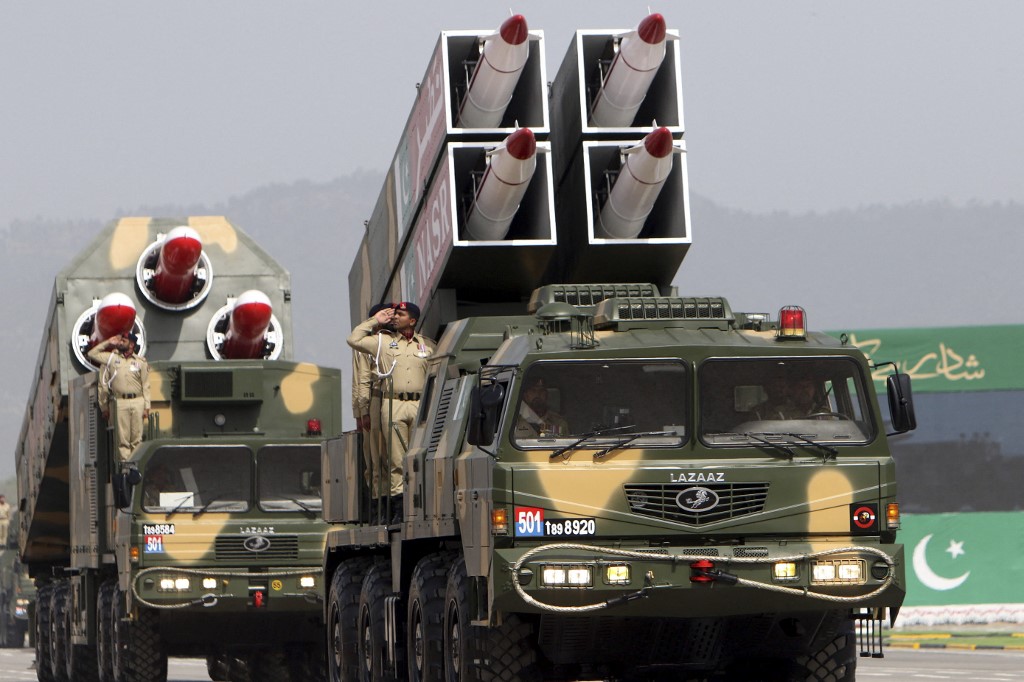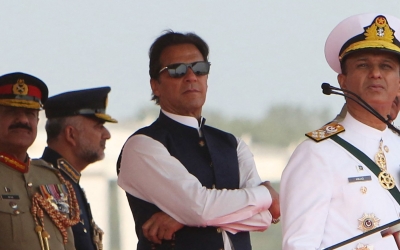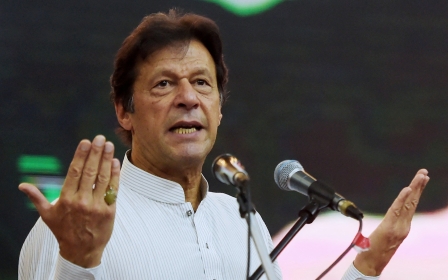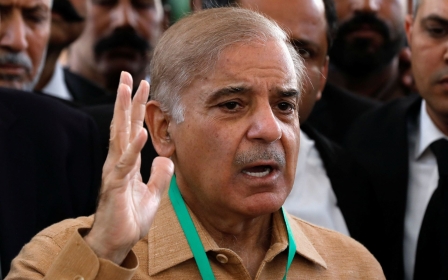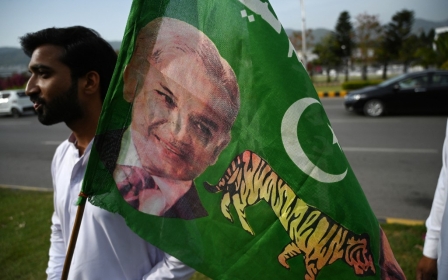Pakistan: Imran Khan could outplay the military and return to power
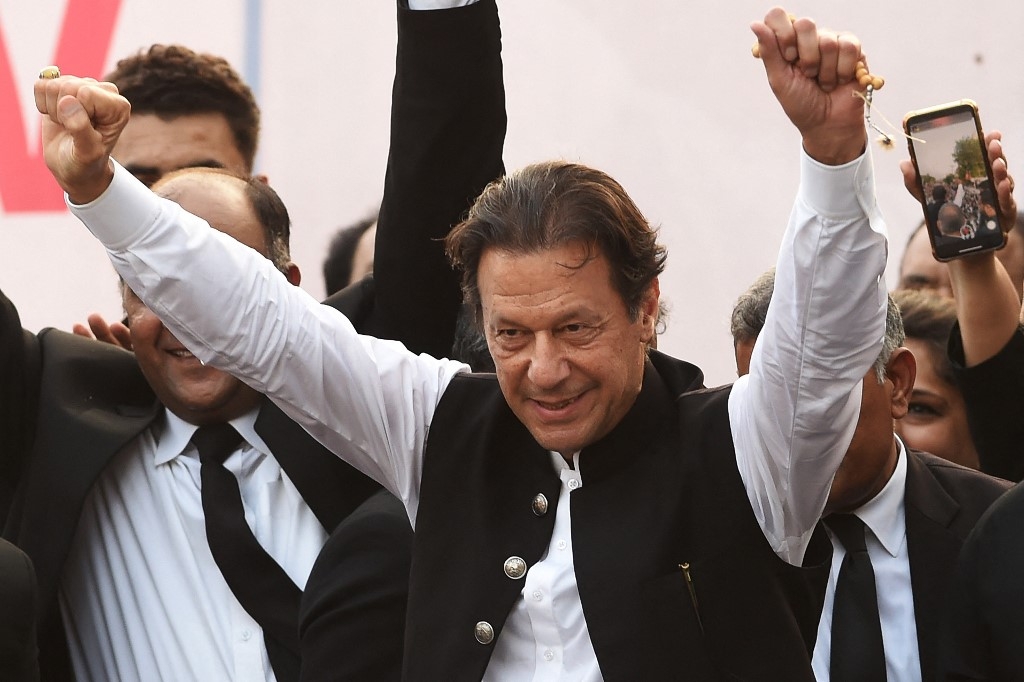
Pakistan’s unique political history has made the relationship between the executive and the military one of the nation’s defining features. The military establishment has usually been the dominant power broker, with most civilian rulers ceding it space in the foreign policy and national security domains. Any attempts to challenge this status quo are met with severe institutional backlash.
Civilian leaders are unable to maintain their political standing without reaching a compromise with the military leadership. But there are signs of potential change, as former Prime Minister Imran Khan has refused to leave the political scene since his removal from office.
Khan has successfully weaponised his brand of populism, which relies heavily on the ethos of national sovereignty and anti-western rhetoric
As a result, Khan has been in a soft confrontation with the country's military for months now. As all other attempts to remove him from the political fold failed, he was eventually disqualified from holding public office by the country's election commission.
This disqualification may eventually be quashed by the country's courts, however it is indeed another episode in the saga unfolding between Khan and the country's military establishment.
Pakistan’s civil-military relationship is tied to the state’s post-colonial nature. After obtaining its independence from Britain in 1947, the new state of Pakistan lacked functional institutional infrastructure, meaning it had to rebuild from scratch. The one exception was its inheritance of a strong military, which was a contributing factor in Pakistan’s evolution towards becoming a praetorian state.
New MEE newsletter: Jerusalem Dispatch
Sign up to get the latest insights and analysis on Israel-Palestine, alongside Turkey Unpacked and other MEE newsletters
During the first decade after independence, as political uncertainty reigned supreme, the military staged a coup in the name of restoring political order and economic stability. This paved the way for future military interventions, giving the army a tried and tested political raison d’etre.
Governments led or dominated by the military have ruled Pakistan for a combined total of more than three decades. When civilian partners have been in place, they have played second fiddle to the military. Even during the democratic experience of the 1990s, and after the restoration of democracy in 2008, successive civilian governments have never held absolute power, being forced to reach negotiated understandings with the military establishment.
Special role
The political landscape that emerged after the departure from the presidency of General Pervez Musharraf in 2008 saw the military finally take a step back, allowing the democratically elected government to exercise its political powers. Yet, owing to the deteriorating security situation within the country and ongoing military operations in the northwest, the army’s special role within the policymaking domain remained intact.
In 2010, the government led by the Pakistan Peoples Party opted to give then-army chief General Ashfaq Parvez Kayani a three-year extension. But this goodwill didn’t go far, as the civil-military relationship again became tense in the aftermath of the so-called memogate scandal, which led to the ousting of Husain Haqqani, Pakistan’s former ambassador to the US and a key confidant of then-President Asif Ali Zardari.
In the 2013 election, Khan’s Pakistan Tehreek-e-Insaf (PTI) posed a significant challenge to the Pakistan Muslim League-Nawaz (PML-N), which ultimately won the vote. The following year, allegedly with the backing of the military, the PTI staged a sit-in in Islamabad, and in 2016, the Dawn Leaks episode further tarnished the government’s relationship with the military. Then-Prime Minister Nawaz Sharif was ultimately removed from office in 2017 over a Supreme Court decision related to a corruption scandal stemming from the Panama Papers.
With Khan’s election in July 2018, the civil-military relationship embarked on a positive trajectory, as a new symbiotic relationship built on mutual trust was established between the military and the executive. This dynamic was anchored on the personal chemistry between Khan and army chief General Qamar Javed Bajwa.
The Khan government’s perfect alignment with the military was exhibited during the 2019 Balakot crisis, India’s 2019 annexation of Kashmir, and the conflict in Afghanistan. This alignment factored into the government’s decision to award Bajwa a three-year extension in 2019.
Domestically, Khan’s government was able to persevere against political odds, owing to the prime minister’s proximity to the former head of Pakistan’s intelligence service, Lieutenant General Faiz Hameed. The latter virtually become the eyes and ears of the prime minister, which eventually made the army chief a bit uneasy, as he increasingly saw Hameed as Khan’s man, rather than as his institutional subordinate.
Political capital
Furthermore, Khan’s populist and anti-western foreign policy rhetoric amid the US departure from Afghanistan in August 2021, alongside his categorical refusal to let the Americans use Pakistani soil for any future military operations in Afghanistan, undermined the broader institutional interests of Pakistan’s military establishment, and increasingly made him a political liability.
As the army opted to remove Hameed from his intelligence post, it was clear that the military was no longer backing the government. This led to the opening of blocked political alleyways for the country’s opposition, and earlier this year, Khan was rather unceremoniously removed from power.
The new government of Prime Minister Shehbaz Sharif enjoys the full backing of Pakistan’s military, as shown by statements from its media wing. But Sharif’s hodgepodge coalition government has thus far failed to stabilise the country’s economy or to usher in an era of political certainty. All of this has played directly into the hands of Khan, whose political capital has increased monumentally.
Khan has successfully weaponised his brand of populism, which relies heavily on the ethos of national sovereignty and anti-western rhetoric. This was evident as his party won a comprehensive victory in July by-elections in the politically crucial Punjab province, reclaiming power from the PML-N. This has further weakened the hand of the central government, which can no longer control its political power base in Punjab.
In the current atmosphere, Khan remains confident, while the Sharif government faces a raft of economic, political and environmental challenges. Still, the latter retains the complete endorsement of the country’s military establishment, which continues to view Khan as a reckless political figurehead whose return to power would be catastrophic.
This calculus may evolve in November, as a change of command takes place in the military. The new army chief may decide to distance himself from the legacy of the outgoing chief and to revise the institution’s political approach. Such developments may ultimately pave the way for general elections that could reconstitute Pakistan’s political and civil-military balance.
The views expressed in this article belong to the author and do not necessarily reflect the editorial policy of Middle East Eye.
Middle East Eye delivers independent and unrivalled coverage and analysis of the Middle East, North Africa and beyond. To learn more about republishing this content and the associated fees, please fill out this form. More about MEE can be found here.



